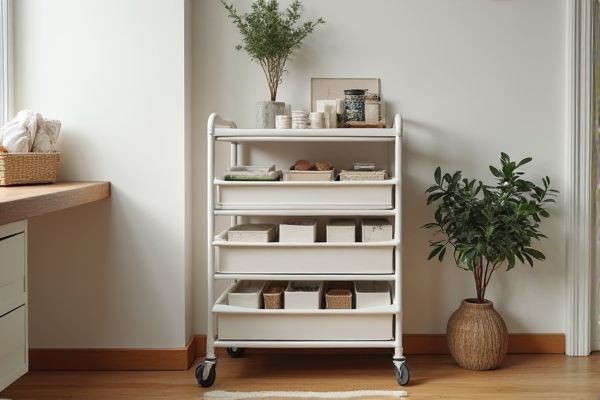
Rolling carts offer mobility and flexibility, making it easy to move your storage wherever needed, while fixed storage provides stability and maximizes space usage in a designated area. Explore the rest of this article to determine which storage solution best suits your organizational needs.
Table of Comparison
| Feature | Rolling Cart | Fixed Storage |
|---|---|---|
| Mobility | Easy to move around, portable | Stationary, no mobility |
| Space Efficiency | Flexible use of space, can be repositioned | Optimized for permanent storage locations |
| Weight Capacity | Often lighter, limited weight support | Supports heavier loads, more stable |
| Installation | No installation required | Requires fixed installation or mounting |
| Accessibility | Accessible from multiple areas | Accessible from a fixed location only |
| Use Cases | Ideal for dynamic environments, workshops, offices | Best for permanent storage, warehouses, closets |
| Cost | Generally lower cost | Potentially higher cost due to installation |
Introduction to Rolling Carts and Fixed Storage
Rolling carts offer versatile, mobile storage solutions that enable easy access and efficient organization in dynamic spaces such as offices, kitchens, or workshops. Fixed storage units provide stable, permanent placement ideal for maximizing space in defined areas like garages or closets. Your choice depends on the need for mobility versus the requirement for fixed, durable storage options.
Key Differences Between Rolling Carts and Fixed Storage
Rolling carts offer mobility and flexibility, allowing easy transport of items across different spaces, while fixed storage remains stationary, providing a permanent and stable organization solution. Rolling carts typically feature wheels and lightweight materials for convenience, whereas fixed storage units are often built with sturdier construction for durability and higher weight capacity. The choice between rolling carts and fixed storage depends on the need for portability versus long-term, fixed placement in homes, offices, or industrial settings.
Mobility and Flexibility Considerations
Rolling carts provide superior mobility and flexibility, allowing you to easily move tools and supplies across different workspaces as needed. Fixed storage offers stability and maximizes space utilization but lacks the adaptability to reposition items quickly. Choosing between rolling carts and fixed storage depends on whether your priority is dynamic access or permanent organization.
Space Optimization: Which Storage Solution Wins?
Rolling carts optimize space by providing mobility and flexible storage options, allowing you to easily reconfigure your layout as needed. Fixed storage solutions maximize vertical and wall space, offering more stability and often greater capacity in a smaller footprint. Your choice depends on whether you prioritize adaptable space usage with rolling carts or permanent, high-density storage with fixed units.
Durability and Longevity Comparison
Rolling carts are designed with mobility in mind, often featuring durable materials like steel or reinforced plastic that withstand frequent movement and stress. Fixed storage units tend to have greater structural stability and can support heavier loads over time without risk of damage from shifting. You should choose based on whether your priority is long-term durability in a stationary environment or flexibility combined with robust construction for frequent relocation.
Cost Analysis: Upfront and Long-term Investment
Rolling carts typically require a higher upfront investment compared to fixed storage due to added features like wheels and mobility mechanisms, though they can save money long-term by offering flexible space optimization and easy relocation. Fixed storage units, often less expensive initially, may incur higher modification and maintenance costs over time as space needs evolve. Evaluating total cost of ownership should include purchase price, installation, durability, and adaptability to changing storage demands to determine the optimal financial investment.
Use Cases for Rolling Carts
Rolling carts provide versatile and mobile storage solutions ideal for environments requiring frequent rearrangement, such as workshops, kitchens, and offices. They allow you to transport tools, supplies, or documents effortlessly between workstations, enhancing productivity and reducing downtime. Unlike fixed storage, rolling carts adapt to dynamic workflows, supporting tasks that demand flexibility and accessibility.
Use Cases for Fixed Storage
Fixed storage solutions are ideal for organizing heavy tools, appliances, and bulk materials that require stable, permanent placement in workshops or garages. Their solid construction supports larger loads and maximizes vertical space efficiency, making them perfect for long-term storage needs. You benefit from a clutter-free environment with easy access to frequently used items without worrying about mobility or repositioning.
Choosing the Right Storage for Your Needs
Rolling carts offer versatile mobility, making them ideal for dynamic spaces where You need to frequently move or reconfigure storage. Fixed storage solutions provide stability and higher load capacity, perfect for organizing heavy items or creating permanent storage zones. Assess the balance between flexibility and durability based on Your space and usage requirements to choose the best option.
Conclusion: Rolling Cart or Fixed Storage?
Rolling carts offer greater mobility and flexibility for dynamic spaces, enabling easy relocation and access to stored items. Fixed storage provides enhanced stability and maximizes space efficiency, ideal for permanent setups requiring heavy-duty support. Choosing between rolling carts and fixed storage depends on the need for portability versus stability in your specific environment.
 homyna.com
homyna.com